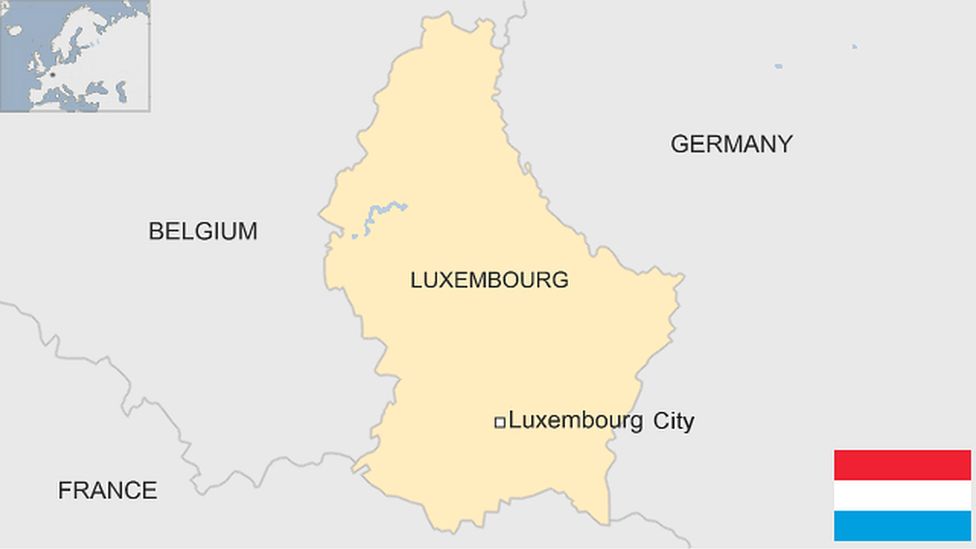Luxembourg country profile
- Published

The Grand Duchy of Luxembourg - a small country landlocked by Belgium, France and Germany - is a prominent financial centre.
With roots stretching back to the 10th Century, Luxembourg's history is closely intertwined with that of its more powerful neighbours, especially Germany.
Many of its inhabitants are trilingual in French, German and Luxembourgish.
Despite declaring its neutrality, Luxembourg was occupied by Germany during both World Wars.
After renewed occupation in World War Two, Luxembourg abandoned its neutrality and became a front-rank enthusiast for international co-operation.
Luxembourg's prosperity was formerly based on steel manufacturing. With the decline of that industry, Luxembourg diversified and is now best known for its status as Europe's most powerful investment management centre.
- Read more country profiles - Profiles by BBC Monitoring
GRAND DUCHY OF LUXEMBOURG: FACTS
- Capital: Luxembourg city
- Area: 2,586 sq km
- Population: 645,400
- Languages: Luxembourgish, also French, German
- Life expectancy: 79 years (men) 84 years (women)
LEADERS
Head of state: Grand Duke Henri
The ruling Grand Duke of Luxembourg succeeded to the title in 2000, on the abdication of his father Jean. He had already exercised the constitutional powers of the monarch since 1998.
Born in 1955, the future Grand Duke Henri studied politics in Geneva, where he met his Cuban wife Maria Teresa. He later underwent officer training at Britain's Sandhurst Academy.
The head of state's constitutional role is largely ceremonial. In 2008, following a bitter controversy over euthanasia parliament rescinded the Grand Duke's veto powers after Henri opposed the pro-euthanasia law on religious grounds.
Prime Minister: Luc Frieden
Luc Frieden became Luxembourg's Prime Minister in November 2023 following six weeks of talks after the October 2023 elections, which saw his Christian Social People's Party (CSV), Luxembourg's long-dominant centre-right party, slightly increasing its vote share. The incumbent coalition led by Xavier Bettel's ruling coalition lost its majority due to a decline in support for the The Greens.
Frieden, a former finance minister, leads a coalition of his own Christian Social People's Party and the liberal party of former Prime Minister Xavier Bettel, who has taken over as the country's foreign minister.
MEDIA
Luxembourg exerts immense media clout and has a long tradition of operating radio and TV services for pan-European audiences, including those in France, Germany and the UK.
Generations of British listeners grew up with Radio Luxembourg, which beamed pop music programmes into the UK. "The Great 208" is no more, but media group RTL is still a key player in media markets across Europe.
Luxembourg's media empire extends to the skies. It is home to Europe's largest satellite operator, Societe Europeenne des Satellites (SES), which operates the Astra fleet.
TIMELINE
Some key dates in the history of Luxembourg:
1839 - Treaty of London gives the western part of the country to the recently-created state of Belgium - giving Luxembourg its modern-day borders.
1866 - Luxembourg crisis nearly sees war between France and Prussia as neither is willing to concede influence in Luxembourg to its rival. The crisis is solved by an agreement on Luxembourg's independence and neutrality at the Second Treaty of London in 1867.
1914 - Outbreak of World War One. Luxembourg is occupied by Germany until 1918.
1920 - Luxembourg joins the League of Nations.
1921 - Luxembourg enters economic union with Belgium. The use of the Belgian currency in Luxembourg is permitted.
1940-44 - Luxembourg is again occupied by Germany during World War Two.
1948 - Luxembourg abandons its neutrality and forms an economic union with Belgium and the Netherlands - the Benelux countries.
1949 - Luxembourg joins Nato.
1957 - Luxembourg becomes founder member of the European Economic Community (now the European Union) which comes into effect in January 1958.
1964 - Grand Duchess Charlotte abdicates in favour of her son, who becomes Grand Duke Jean.
1992 - Luxembourg adopts the Maastricht Treaty creating the European Union.
2000 - Crown Prince Henri becomes Grand Duke of Luxembourg on the abdication of his father, Jean.
2002 - Euro introduced as national currency.
2008 - Parliament approves reform restricting the monarch to a purely ceremonial role after Grand Duke Henri's threat to block a bill legalising euthanasia sparks a constitutional crisis.
2009 - G20 adds Luxembourg to "grey list" of countries with questionable banking arrangements. Shortly afterwards the Organisation for Economic Co-operation and Development (OECD) commends Luxembourg for improving financial transparency with agreements with a dozen countries.
2014 - Luxembourg's parliament votes to legalise same-sex marriage. The so-called LuxLeaks scandal casts light on how Luxembourg helped hundreds of multi-national companies - Apple, Ikea, and Pepsi among them - save billions of dollars in tax payments.
2016 - In a continuation of the so-called LuxLeaks scandal, two former employees of accounting firm PricewaterhouseCoopers are given suspended prison sentences for leaking confidential documents revealing corporate tax deals.
Related Topics
- Published21 August 2023
- Published28 November 2023
- Published4 September 2023
- Published19 June 2023
- Published9 January
- Published22 May 2023